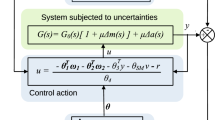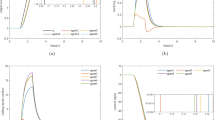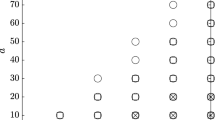Abstract
This paper studies the passivity of the T–S fuzzy singular system with randomly occurring uncertainties via the event-based sliding mode control. The sliding surface function is designed such that the resulting sliding mode dynamics can be expressed by the considered system. Some sufficient conditions are proposed to guarantee the sliding mode dynamics is generalized admissible and robustly passive. Under the aperiodic sampled-data environment, the sliding mode control law is proposed via the event-triggered method. It guarantees that the state trajectory of the system can be driven onto the predefined sliding surface in a finite time and keep it forever. Finally, three examples are given to demonstrate the feasibility and superiority of the design method.













Similar content being viewed by others
References
Amrouche B, Cherif TO, Ghanes M et al (2018) A passivity-based controller for coordination of converters in a fuel cell system used in hybrid electric vehicle propelled by two seven phase induction motor. Int J Hydrogen Energy 42:26362–26376
An J, Wen G (2011) Improved stability criteria for time-varying delayed T–S fuzzy systems via delay partitioning approach. Fuzzy Sets Syst 185(1):83–94
Bo W, Zhang Q, Hui W (2013) Passivity analysis for uncertain T–S fuzzy descriptor system with time-delay via sliding mode control. In: Proceedings of the 32nd Chinese control conference. IEEE, New York, pp 3504–3509
Chen J, Lin C, Chen B et al (2017) Mixed \({H_\infty }\) and passive control for singular systems with time delay via static output feedback. Appl Math Comput 293:244–253
Fei J, Lu C (2018) Adaptive fractional order sliding mode controller with neural estimator. J Franklin Inst 355(5):2369–2391
Feng Z, Lam J (2006) Robust control and filtering of singular systems. Int J Syst Sci 47(11):2532–2542
Gao H, Chen T, Lam J (2008) A new delay system approach to network-based control. Automatica 44:39–52
Guo S, Zhu F, Xu L (2015) Unknown input observer design for Takagi–Sugeno fuzzy stochastic system. Int J Control Autom Syst 13(4):1003–1009
Hu C, Jiang H, Teng Z (2011) General impulsive control of chaotic systems based on a T–S fuzzy model. Fuzzy Sets Syst 174(1):66–82
Kchaou M, Souissi M, Toumi A (2013) Delay-dependent stability and robust \({L_2} - {L_\infty }\) control for a class of fuzzy descriptor systems with time-varying delay. Int J Robust Nonlinear Control 23:284–304
Kong C, Ma Y, Liu D (2019) Observer-based quantized sliding mode dissipative control for singular semi-Markovian jump systems. Appl Math Comput 362:124539
Koumboulis FN, Skarpetis MG, Tzamtzi MP (2015) Robust input–output decoupling for singular systems with nonlinear uncertain structure. In: Proceedings of the European control conference. IEEE, New York, pp 3946–3950
Kumaresan N (2011) Optimal control for stochastic linear quadratic singular periodic neuro Takagi–Sugeno (T–S) fuzzy system with singular cost using ant colony programming. Appl Math Model 35(8):3797–3808
Lei T, Chen Z, Song Q et al (2013) Passivity analysis and passive control for T–S fuzzy systems with leakage delay and mixed time-varying delays. Abstr Appl Anal 2013(1):1140–1174
Li C, Yu W, Huang T (2014) Impulsive synchronization schemes of stochastic complex networks with switching topology: average time approach. Neural Netw 54(6):85–94
Li H, Liao X, Chen G et al (2015) Event-triggered asynchronous intermittent communication strategy for synchronization in complex dynamical networks. Neural Netw 66:1–10
Li H, Wang J, Shi P (2016) Output-feedback based sliding mode control for fuzzy systems with actuator saturation. IEEE Trans Fuzzy Syst 24(6):1282–1293
Li H, Wang J, Lam HK et al (2017) Adaptive sliding mode control for interval type-2 fuzzy systems. IEEE Trans Syst Man Cybern Syst 46(12):1654–1663
Luo WP, Yang J, Zhao X (2016) Free-matrix-based integral inequality for stability analysis of uncertain T–S fuzzy systems with time-varying delay. Int J Control Autom Syst 14(4):948–956
Ma Y, Yang P, Zhang Q (2016) Robust \({H_\infty }\) control for uncertain singular discrete T–S fuzzy time-delay systems with actuator saturation. J Franklin Inst 2016(353):3290–3311
Ma Y, Jia X, Liu D (2018) Finite-time dissipative control for singular discrete-time Markovian jump systems with actuator saturation and partly unknown transition rates. Appl Math Model 53:49–70
Mathiyalagan K, Balachandran K (2016) Finite-time stability of fractional-order stochastic singular systems with time delay and white noise. Complexity 21:370–379
Mohammed S, Huo W, Huang J et al (2017) Nonlinear disturbance observer based sliding mode control of a human-driven knee joint orthosis. Robot Auton Syst 75:41–49
Peng W, Jian J (2018) Passivity analysis of memristor-based impulsive inertial neural networks with time-varying delays. ISA Trans 74:88–98
Rakkiyappan R, Chandrasekar A, Cao J (2015) Passivity and passification of memristor-based recurrent neural networks with additive time-varying delays. IEEE Trans Neural Netw Learn Syst 26(9):2043–2057
Song X, Wang Z, Shen H et al (2017) A unified method to energy-to-peak filter design for networked Markov switched singular systems over a finite-time interval. J Franklin Inst 354(17):7899–7916
Stramigioli S, Secchi C, Schaft AJ et al (2016) A novel theory for sampled data system passivity. In: International conference on intelligent robots and systems, vol 2. IEEE, New York, pp 1936–1941
Su X, Xia F, Yang R et al (2016) Reduced-order filter design of T–S fuzzy stochastic systems with time-varying delay. J Franklin Inst 2016(354):2310–2339
Sun C, Wang F, He X (2016) Delay-dependent stability and stabilization criteria for T–S fuzzy singular systems with interval time-varying delay by improved delay partitioning approach. Springerplus 5(1):349
Taniguchi T, Tanaka K, Wang HO (2000) Fuzzy descriptor systems and nonlinear model following control. IEEE Trans Fuzzy Syst 8(4):442–452
Wang H, Zhou B, Lu R et al (2014) New stability and stabilization criteria for a class of fuzzy singular systems with time-varying delay. J Franklin Inst 351:3766–3781
Wen S, Huang T, Yu X et al (2016) Aperiodic sampled-data sliding-mode control of fuzzy systems with communication delays via the event-triggered method. IEEE Trans Fuzzy Syst 24(5):1048–1057
Xing S, Zhang Q, Zhu B (2017) Mean-square admissibility for stochastic T–S fuzzy singular systems based on extended quadratic Lyapunov function approach. Fuzzy Sets Syst 307:99–114
Zeng HB, Ju HP, Xia JW et al (2014) Improved delay-dependent stability criteria for T–S fuzzy systems with time-varying delay. Appl Math Comput 235:492–501
Zeng HB, He Y, Wu M et al (2017) Improved conditions for passivity of neural networks with a time-varying delay. IEEE Trans Cybern 44(6):785–792
Zhang Z, Lin C, Chen B (2014) New stability and stabilization conditions for T–S fuzzy systems with time delay. Fuzzy Sets Syst 2015(263):82–91
Zhang H, Shen Y, Feng G (2016) Delay-dependent stability and \({H_\infty }\) control for a class of fuzzy descriptor systems with time-delay. Fuzzy Sets Syst 160(12):1689–1707
Zhao W, Ma Y, Chen A et al (2019) Robust sliding mode control for Markovian jump singular systems with randomly changing structure. Appl Math Comput 349:81–96
Zhou B, Liao X, Huang T et al (2015) Leader-following exponential consensus of general linear multi-agent systems via event-triggered control with combinational measurements. Appl Math Lett 40:35–39
Zhou B, Liao X, Huang T et al (2015) Pinning exponential synchronization of complex networks via event-triggered communication with combinational measurements. Neurocomputing 157:199–207
Acknowledgements
This work is partially supported by the National Natural Science Foundation of China no. 61273004, and the Natural Science Foundation of Hebei province no. F2018203099.
Author information
Authors and Affiliations
Corresponding author
Additional information
Communicated by Antonio José Silva Neto.
Publisher's Note
Springer Nature remains neutral with regard to jurisdictional claims in published maps and institutional affiliations.
Rights and permissions
About this article
Cite this article
Han, X., Ma, Y. Passivity analysis for singular systems with randomly occurring uncertainties via the event-based sliding mode control. Comp. Appl. Math. 39, 99 (2020). https://doi.org/10.1007/s40314-020-1086-z
Received:
Revised:
Accepted:
Published:
DOI: https://doi.org/10.1007/s40314-020-1086-z
Keywords
- T–S fuzzy singular system
- Time-varying delay
- Randomly occurring uncertainties
- Event-based sliding mode control
- Aperiodic sampled-data




